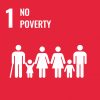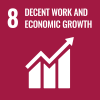Svaliava , 19 September 2022 – As soon as you enter Mirella’s confectionery, you are immediately tempted to try every dessert. Since 2016, the confectionary offers traditional Ukrainian treats, as well as modern cakes and signature desserts.
The owner, Myroslava Holonych, dreamed of opening this place in her hometown of Svaliava, a town tucked in the greenery of the mountains in Zakarpattia, west Ukraine, since she was a teenager. Currently, the region hosts nearly 400,000 internally displaced persons (IDPs) who were forced to flee their homes following the Russian invasion.
"The business’ logo has a four-leaf clover for a reason. When I was a child, I would go out with my grandmother to search for the leaves. Life was difficult then and she believed that the plant would bring good luck and a prosperous fate. So, the clover here represents a loved one's remembrance and a sign of hope," says Myroslava.

Mirella’s logo. Photo: IOM/Jorge Galindo
The chef honors the past not only in the logo of her business. Myroslava revives old recipes that were once popular in Ukraine. Her main source of inspiration? Her grandmother's notebook. Notes such as “maybe for use” or ”this recipe is bad” are scribbled on the book’s margins, proof of the meticulous process behind Myroslava’s delights. She also owns old books telling the story of her region’s rich cuisine.

Preserved inside the pages of her cookbooks are Myroslava’s old family photos which tell the story of her mixed Hungaro-Ukrainian heritage. Photo: IOM/Jorge Galindo
"This is a Hungarian book from 1932 written by Mariska Vízváry, an Austrian opera singer originally from Berehove,” she says, pointing to a stack of fragilely bundled pages. “My mother helps me translate from Hungarian. There are recipes here that you will not find anywhere else," she says.
Myroslava enjoys trying new things too. She created a dessert made with porcini mushrooms, that has become the business card of Svaliava. The recipe is a jealously guarded secret because of its high popularity among her clientele.

Mirella’s famous Svaliava cake. Photo: IOM/Jorge Galindo
Behind Mirella’s success is a small team of five employees united by a great love for their craft. Among them is Myroslava’s eldest daughter Anastasia, as well as Viktoriia, a former language teacher who was forced to flee her home on the outskirts of Mariupol due to the war. In search of help, she reconnected with the family of Myroslava’s sister-in-law, an old school friend, who put her in touch with the pastry chef.


Viktoriia (left, in the first photo) arrived in Svaliava after fleeing her home near Mariupol. Photo: IOM/Jorge Galindo
As the war rages on, the economic situation of IDPs worsens. Only 31 per cent of IDPs surveyed by the latest IOM Ukraine General Population Survey reported that they were involved in paid work. In these difficult times, small businesses like Mirella’s have the potential of creating new opportunities for job seekers in the country.
As the cake shop continues to grow, so does Myroslava’s reputation as a savvy entrepreneur. Recently, she was nominated for one of the 100 best entrepreneurs in the "Heritage and Traditions" category of the Ukrainian National Award "Heroes of Small Business", and in September she will travel to Turin, Italy, to represent Ukraine at the Slow Food Gastronomic festival.
The pastry chef dreams of expanding her business and plans to increase the number of desserts. "I research the dishes of our ancestors and want to share this with everyone… Our culture is incredible and must be revived!"
Earlier this month, the International Organization for Migration (IOM) awarded her with a grant under the programme "SME Boost: Economic Integration of Internally Displaced Persons and Business Recovery", funded by the German Federal Ministry for Economic Cooperation and Development (BMZ) through the KfW Development Bank. With the grant, Myroslava hopes to buy new equipment, increase production and expand her team, including with more IDPs. The owner keeps looking for different financial opportunities to grow her thriving business.

Despite the recent small grant, Myroslava keeps her eyes peeled for future opportunities to expand her business. Photo: IOM/Jorge Galindo
Through this project, IOM plans to support 500 micro-businesses, 175 small enterprises, and 60 startups with similar grants. Another 650 businesses will receive training, support and consultancy services. IOM will also engage the Ukrainian diaspora in the implementation of the project through experience and knowledge sharing, as well as providing access to financial and networking opportunities. Read more about IOM’s Ukraine response.
Written by Daria Dovzhenko, IOM Ukraine



